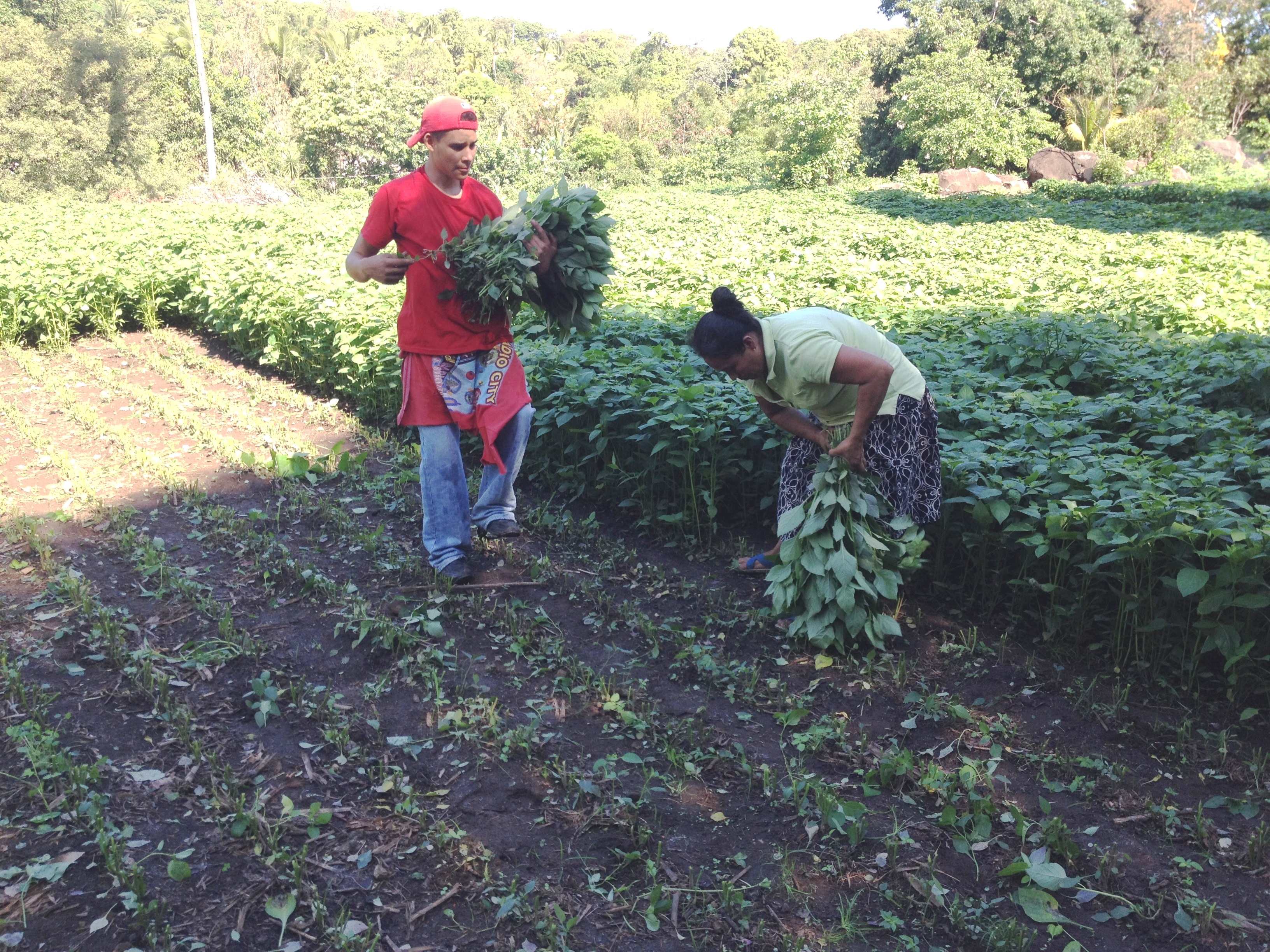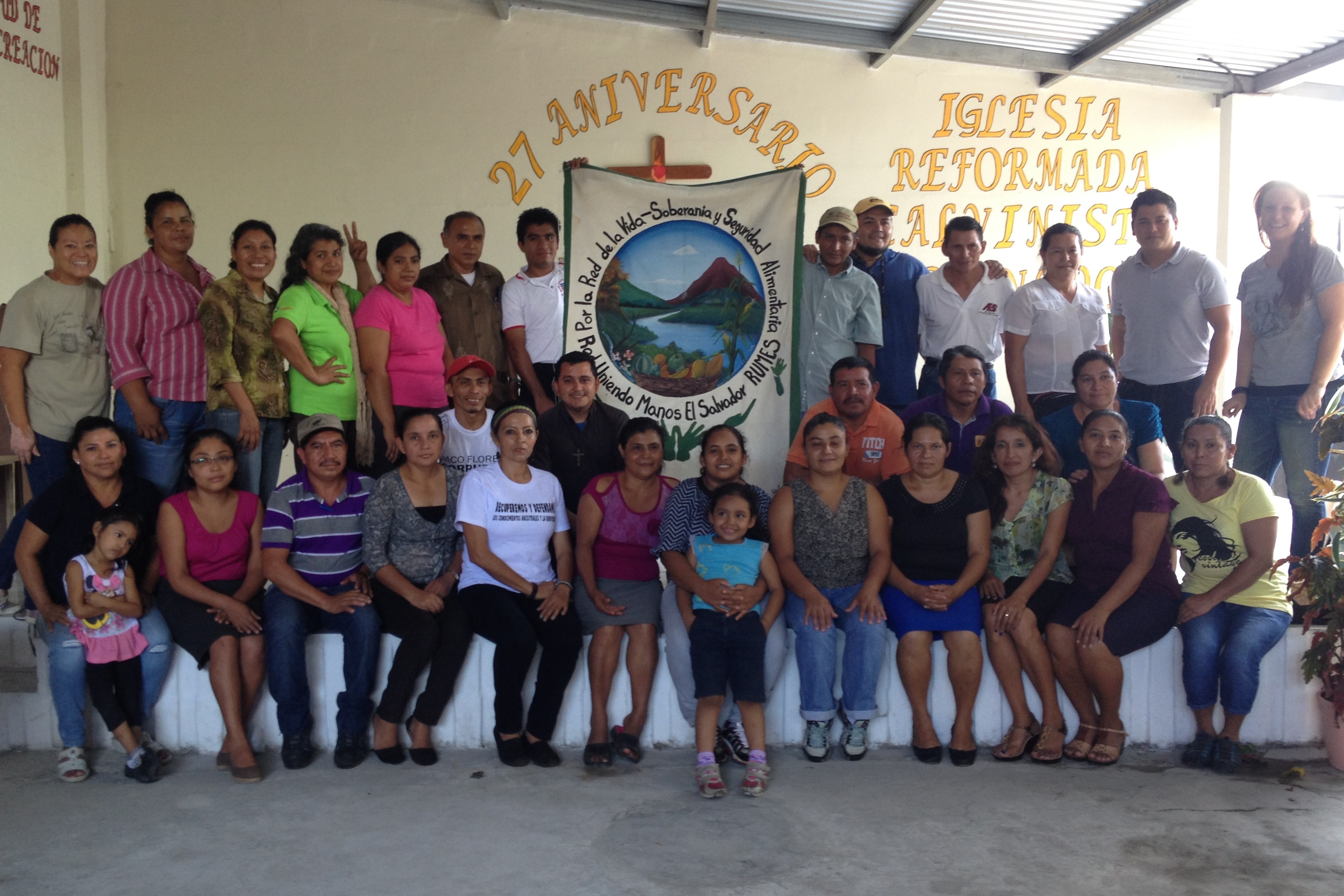By Kristi Van Nostran, Mission Co-worker, RUMES, Joining Hands El Salvador

Mother and son harvesting mora, a highly nutritious leafy green traditionally eaten in soups. Photo Credit: Kristi Van Nostran.
This year marks the five-year anniversary of the Red Uniendo Manos El Salvador (RUMES), the Joining Hands Network of El Salvador, and its mission to work alongside church and community partners – through advocacy and action – to feed hope and fight the injustices that cause hunger and poverty. Over these five years we have learned (the hard way) that mission is messy: leadership comes with challenges, dealing with injustice is overwhelming, accompaniment is not easy, and the only thing that is constant is change.
It is not uncommon to feel frustrated, even angry when coming up against the worldly structures and systems of injustice that keep people hungry and in poverty around the globe. It is easy to fixate on bearing fruit, generating results and measuring outcomes. How many families have achieved food sovereignty? How many delegations will we host in El Salvador next year? How much interest and support have we generated for our campaign; is it enough?
Five years later, the statistics in El Salvador are still glaring; some 1.5 million families are without access to clean water, and one out of five preschool-aged children is suffering chronic malnourishment with nearly one million Salvadorans unable to secure adequate food. Climate change is threatening the health and viability of the ecosystems throughout the region, not to mention the toll the higher temperatures, extreme weather events, and added stress on limited water resources are already taking on human health. Gang violence and related crime have spiked in 2015, placing tiny El Salvador back in the running for the most violent country in the hemisphere, forcing an unprecedented pattern of migration of children, youth and mothers with young children toward the southern borders of the U.S. And, sadly, the list goes on.
The economic and social injustices at play are rooted deep in society and culture, and will not be resolved overnight. Even five years of accompaniment, empowerment and advocacy are just beginning to unearth the impacts of the global systems and structures that keep our Salvadoran sisters and brothers from enjoying the fullness of life and livelihood that God promises to all God’s children. While I know that this transformational ministry requires perseverance and the ability to take the long view, sometimes I still find myself wondering: where are the results; is our work bearing fruit?
In September, thirty-five women, men and young people gathered in San Salvador for the fifth annual General Assembly of the Red Uniendo Manos El Salvador. Many left their communities, before dawn. By foot, in the back of pickup trucks, squeezed into vans and buses filled way beyond capacity, Joining Hands members made their way to the city to lift up the successes and challenges of another year working together for food sovereignty, campaigning against agrotoxins, and advocating for healthy and sustainable agricultural practices.

Red Uniendo Manos El Salvador 2015 “family” photo. Photo Credit: Kristi Van Nostran.
Our partners were eager to relay that despite this year’s severe drought, working with native seed varieties, organic inputs and agroecological practices has enabled their families and communities to enjoy a limited harvest this season as opposed to the widespread famine being experienced in many regions of the country. They were excited to inform that their neighbors are taking notice and are now inquiring about transforming their own plots and kitchen gardens toward healthy and sustainable, organic production. Folks were thrilled to highlight the Tecoluca municipal ordinance – the first of its kind – that will regulate and restrict the use of toxic agrochemicals in local sugarcane production. But beyond all of that and despite the difficult realities faced by all, thirty-five friends were overjoyed to come together in fellowship and to celebrate the hope they share; que otro El Salvador es possible, another way is possible in El Salvador. The side conversations were every bit as fruitful as the business of the day, and the countless smiles, hugs, laughter, and even a few tears that were shared are a testament to the Joining Hands family that has grown out of five years of mutual accompaniment.
It seems to me that when Jesus talks about bearing much fruit, he is not referring to productivity as the world defines it. Jesus’ life and ministry models for us that another way is possible and challenges us to set our priorities thusly; offering connection instead of competition, relationship rather than resentment, showing compassion in the face of callousness, holding in common in place of hoarding, becoming communities that hunger and thirst for justice.
The gathering of the RUMES General Assembly reminded me that we may not be the ones to experience the fruits of our work, yet we are no less called to be co-workers, with God, to make all things new. Though we cannot expect our mission to solve every problem and resolve every issue our Salvadoran sisters and brothers face, we can stand with them – even from a distance – believing, speaking out, and living in hope, trusting in the One who has called us together. And it is through this accompaniment that transformation can, and is taking place.
![]() You may freely reuse and distribute this article in its entirety for non-commercial purposes in any medium. Please include author attribution, photography credits, and a link to the original article. This work is licensed under a Creative Commons Attribution-NonCommercial-NoDeratives 4.0 International License.
You may freely reuse and distribute this article in its entirety for non-commercial purposes in any medium. Please include author attribution, photography credits, and a link to the original article. This work is licensed under a Creative Commons Attribution-NonCommercial-NoDeratives 4.0 International License.
Categories: Hunger & Poverty
Tags: El Salvador, harvest, Joining Hands, Kristi Van Nostran, mora, Red Uniendo Manos El Salvador, RUMES